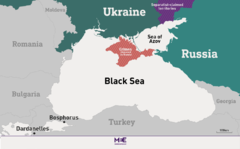Montreux Convention
 | |
The Montreux Convention Regarding the Regime of the Straits, often known simply as the Montreux Convention, is an international agreement governing the Bosphorus and Dardanelles Straits in Turkey. Signed on 20 July 1936 at the Montreux Palace in Switzerland, it went into effect on 9 November 1936, addressing the long running Straits Question over who should control the strategically vital link between the Black and Mediterranean Seas.[1]
The Montreux Convention regulates maritime traffic through the Black Sea. It guarantees "complete freedom" of passage for all civilian vessels during peacetime and permits Turkey to restrict the passage of navies not belonging to Black Sea states. Military vessels are limited in number, tonnage and weaponry, with specific provisions governing their mode of entry and duration of stay. Warships must provide advanced notification to Turkish authorities, which, in turn, must inform the parties to the Convention.
While it was designed for a particular geopolitical context, and remains unchanged since its adoption, the Montreux Convention has endured as a "solid example of a rules-based international order", since most of its terms are still followed. However, there have been some controversies in its implementation, most notably the proposed Istanbul Canal, which would provide another waterway from the Black Sea to the Sea of Marmara, thereby possibly circumventing the Convention.[2]
Russian invasion of Ukraine
On 27 February 2022, Turkey called Russia's invasion of Ukraine a "war" in a rhetorical shift that could pave the way for the NATO member nation to enact an international pact limiting Russian naval passage to the Black Sea.
Under the 1936 Montreux Convention, Turkey has control over the Dardanelles and Bosphorus straits that connect the Mediterranean and Black seas and can limit the passage of warships during wartime or if threatened.
Balancing its Western commitments and close ties to Moscow, Ankara has said the Russian attack is unacceptable but until Sunday had not described the situation as a war:
"On the fourth day of the Ukraine war, we repeat President Tayyip Erdogan's call for an immediate halt of Russian attacks and the start of ceasefire negotiations," presidential spokesperson Ibrahim Kalin said on Twitter.
Kyiv has appealed to Ankara to block any more Russian warships from passing toward the Black Sea, from which Moscow has launched one of its incursions on Ukraine's southern coast.
But Turkey's foreign minister said on Friday that Russia had the right under Montreux to return ships to their home base, which could limit any Turkish policy shift.
Turkey has cultivated good ties with both Russia and Ukraine. Any step too far against Moscow could harm its heavy energy and commodity imports and its tourism sector at a time of domestic economic turmoil.[3]
References
Wikipedia is not affiliated with Wikispooks. Original page source here